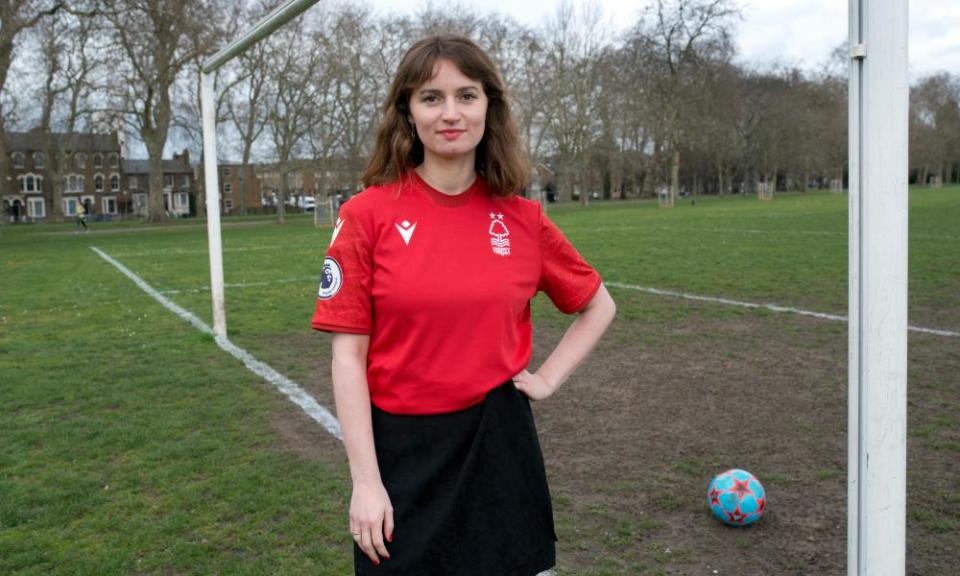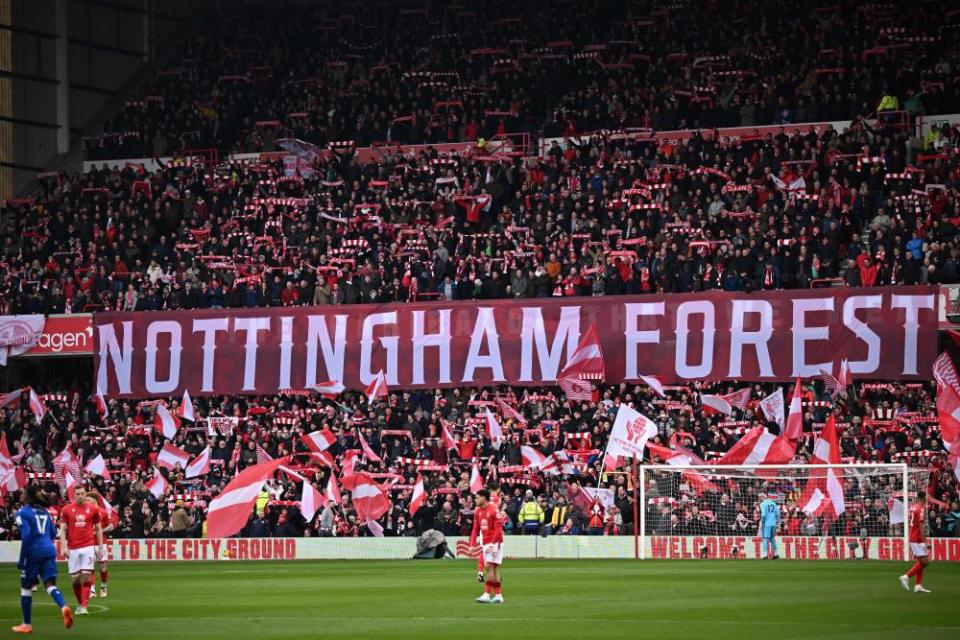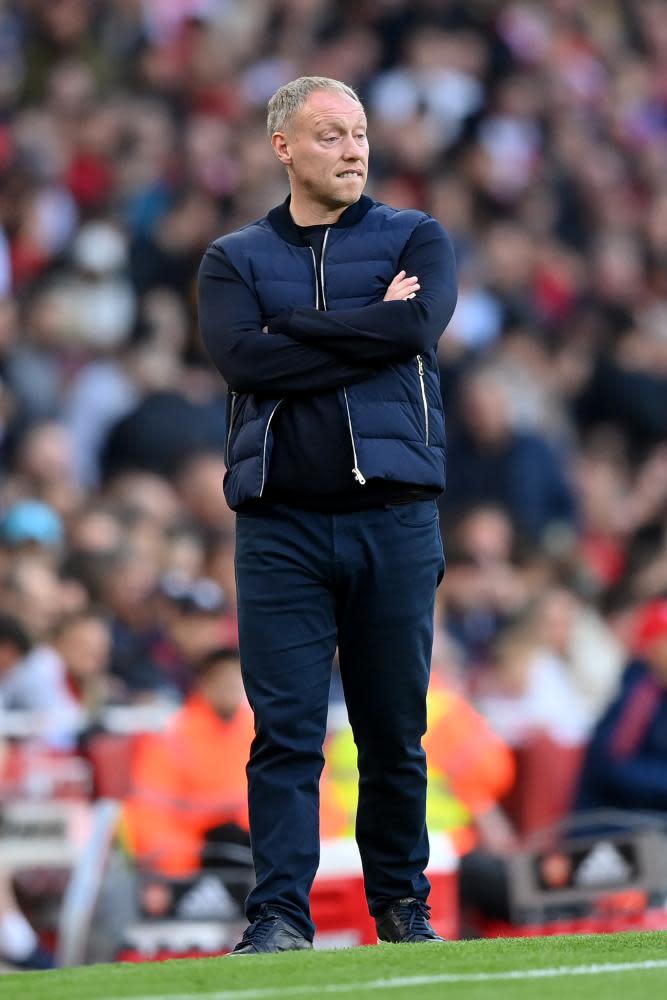Novelist Rebecca Watson: ‘I can leave a show or book unmoved, but with football I always feel’

When I was six, my family’s tin of felt tips began to deplete. I don’t know whether anyone noticed, or how many disappeared. Memory is fickle like that: it doesn’t care for the whole story. What I do remember is that, nights in a row, I would carefully select my least favourite colour before sequestering the pen in my school bag like a top-secret agent. The pens were for a boy in my class who had set me an entry fee. If I wanted to play football at break, then there was a cost. I knew it was because I was a girl, and that it was unfair, but still I handed over my felt tips. The only thing that really mattered was the football.
I never expected that my love of football and my life as a writer would have much overlap, but they do. The space for imagination – for what your mind can build – is vast in football. The experience of being a football supporter is complicated and dramatic, and that’s what I love about it. I love the emotions, the bias, the narrative built into watching a game.
“I frequently walk out of the theatre early without fear of missing anything. But however bad I’ve felt, I’ve never left a football match early,” the late playwright Sarah Kane wrote in 1998, in a prelude to a review of the Edinburgh fringe. Kane was a Manchester United fan, and she describes how the performance of football – how it “puts you in direct physical contact with thought and feeling” – occurs in the best of theatre. I don’t know whether she was the first playwright to explore the overlap between the two, but she definitely wasn’t the last. James Graham’s new play, Dear England, will bring football to the National Theatre this summer. Artistic director Rufus Norris describes the play, which centres on England manager Gareth Southgate, as “a captivating examination into the complex psychology of the much-loved beautiful game”.
Girls with football-supporting dads might be encouraged. Otherwise, it was a space that seemed difficult to slip into
The prospect of football on the stage is exciting, but the connection between football and writing was actually supercharged for me by encountering a book that had nothing to do with the sport. George Saunders’s nonfiction book A Swim in a Pond in the Rain guides the reader through Russian short stories partly to teach them how to listen to their subconscious: he encourages the reader to tune in to what they gel with in a story, what they react against, what they anticipate happening and how that can be rewarded, subverted or disappointed. The book has invaluable advice for reading and writing, but after finishing it I found myself armed with the tools even when I was away from the page. I’d watch matches and hear my brain pipe up, ready to translate the intuitive rise of feeling. The frustration, 35 minutes in – that was the tension unreleased, the constant push and pull of the game not yet translated into a goal. I was drafting another version of the match in my head.

Watching football can have a kaleidoscopic lens: you’re holding the potential of what could happen, of what isn’t happening, of how things could be different. You’re painting a fiction and the players don’t always follow your instructions. That’s why, when my friend invites me round to watch games in his living room, there’s always at least one attendee shouting from the sofa: “No, tackle him! Don’t go that way you idiot!”
Although I was keen to play football, I didn’t support a team growing up. England was a default, but I never had my league team. I grew up in the middle of nowhere, so there wasn’t an easy place to latch on to, but that’s hardly an excuse. Really, it just wasn’t a question I was expected to have an answer for. Boys are encouraged into their teams. They pick one up from their parents, siblings or schoolmates. It’s not always the way, but it seemed the way, growing up. “What team do you support?” was go-to small-talk between boys and adults. One female friend did have a team, but that was inherited from her dad, who bought her and her sisters Pompey shirts, taught them the chants, took them to games. This seemed to be the formula: girls with passionately football-supporting fathers might be encouraged into the world of football, particularly if their dad didn’t have sons. Otherwise, it was a space that seemed difficult to slip into.
In my adult life, I’ve followed the Euros and World Cup, but over the past few years, maybe more, my relationship to football has intensified. I watch a lot of it, for a start. I subscribe to a football publication so I can learn about tactics and insider gossip, read appraisals of players and managers. I don’t know when it took hold but I know a significant step: I started to support Nottingham Forest.
I had an ally – my boyfriend is from Nottingham – and I borrowed his roots. But I wasn’t starting from zero. I had already been following another team for a couple of years. Supporting Watford began as a personal joke, but I’m the punchline really. We are plagued by bad luck, injuries, owners who serially fire managers before they have had a chance. (In the time between writing and filing this piece, Watford fired their manager.) Supporting Forest and Watford is an eccentric combination, one that confounds anyone when I attempt to explain. But it does mean that I’m intimately familiar with the Premier League and Championship, its managers, players and micro-dramas. There’s double the football to pay attention to (double the misery, too).
Players have the intimate distance of fictional characters. We invest them with our emotions but they know nothing of us
If I watch matches below those leagues it can feel like I’m watching an aspect of football. Not because the football is of a lower quality, though inevitably it is, but because my connection to the players slackens. So much of the game is set-dressing. Even if a match is unsatisfying or slow-paced, you have the pull of your players. Football relies on characters. At a semi-professional game in London last month, a player asked my friend for some of her chips before kick-off. He was the one I’d notice the most in the game: there was a kind of affinity when the ball was being guided by Chips’s feet. Players have the intimate distance of fictional characters. We hold on to them and invest them with our emotions while they know nothing of us as individuals. Their world may be real but it is unlike reality.
* * *
My support of Forest was timed to the arrival of a crucial character. In September 2021, Steve Cooper became manager. Passionate but reasonable, Cooper is a beloved figure, with the dozy face of a man who has lit a spliff moments before he appears on screen. He is also seriously good at his job. Forest hadn’t been in the Premier League since 1999; the days of notorious Forest manager Brian Clough like a distant star in the sky. Cooper ushered us back last year (the same season that Roy Hodgson relegated Watford to the Championship – that’s the thing with supporting two teams: timelines overlap, emotions contradict). If Forest hadn’t been promoted, I like to think I’d love Cooper anyway. His disposition goes against the red-card-manner of managers such as Jürgen Klopp and Pep Guardiola, who skim the touchlines of the pitch with their toes as they scream frantically during games. Cooper restrains his passion. He keeps his head (and his professionalism). But of course I would talk highly of the man; he’s attached to the story.

So much of football is subjective. Supporters’ perspectives compete, after all. Attack is another’s defence. My wonder-boy, Brennan Johnson, is someone else’s expletive in the mouth. Genuine injury is time-wasting to another. Often the dramatics on the pitch follow the same rule as theatre: players argue, only for the match to wrap up and aggro to turn to hugs and handshakes. But unlike theatre, no one needs to work at building those stakes. I can leave a show or book unmoved; with football, I always feel. But whether football or fiction, the viewer fills in the gaps – we puff the last of the air into the balloon. As a writer, being a football supporter reinforces the role of the imagination in the reader. It’s about finding the detail the reader will retain, the specificity that will fuel their brain. So that next time the character appears, the reader thinks: ah yes, there’s Chips.
Football shares many traits with fiction: an audience engaging with characters, the tension and connection, the feeling of entering the unknown. Matches are performances, but they shift in type. In person, you have that thrill of the player just there; you have a sense of weight and breadth, the curl of a ball and how the player claims the speeding bulk of it. On TV, you can admire the allness of a game: the formations, the set-pieces, the loud thwack of a ball near a mic on the far side of the pitch. Then there are the matches that I watch via refreshing the score on my phone while I’m on my way somewhere, or at the pub. Those 90 minutes where every second is the potential of the opposition in our box; where every refresh of the screen could bring change. There’s so much to imagine in the space of nothing.
Football is all of this; the way it infiltrates your life. As your imagination sets in, you are sending out bonds that make it hard to detach. I still have the screenshot I took of the live score between Watford and Burnley last month: 1-0 to Watford, 90+5 minutes. Burnley had 0.3% chance of winning, 7.6% chance of a draw. Seconds later, the screen updated to show Burnley had scored. Their goal drew them level, but it felt like a loss. Yet if I had checked the score at the end of the match, it wouldn’t have: it would be a point against a team we would have been foolish to expect a win against. Not much is objective in football.
“When I write about United’s performance,” Sarah Kane mused, “I can’t help but write in the present tense.” It seems like more than coincidence that Kane was passionate about football (though her shared surname with the current England captain is coincidence). She’s influential to me as a writer, and what I recognise in her plays, and in my own ambition as a writer, is that stab of the present. Writing present-tense immediacy is to convey life as a lattice of intersecting lines rather than a single line pointing from one action to the next; it is to present our impulses, distractions, wants, fears, all buried under the simplicity of taking a breath, moving a step. In football, that background is brought forward so that where we place our feet carries the stakes. It is a kind of mind-body connection that I can only really describe as alive.
I think I was six when I smuggled felt tips into school, but I could have been younger. When I was eight, maybe nine, I remember tackling a boy during a match. A different school, a different boy. He shouted in fury at my success and ran after me to kick my leg. I didn’t have to work my brain to know that the anger, the kick, was because he was embarrassed to be tackled by a girl. I’m sure my return to football was encouraged by the surging interest in women’s football. It’s been moving to see women and football become an increasingly normalised combination in the public eye. Last year I read Suzanne Wrack’s A Woman’s Game and learned how successful women’s football used to be – more so than men’s (which was why the FA banned it). And yet, I nudge myself, I’m following two male football teams. How does that add up?
It’s certainly far cheaper to go to see women’s football. I’ll soon have seen England play twice; I’ve never seen the England men’s team play, and can’t imagine I ever will, unless someone else stumps up the cash. At the Women’s Euros final last year, surrounded by women, families and an atmosphere positive but less concentrated, no risk of bubbling over, I felt at home. (At a recent Leyton Orient men’s game, I was the only woman drinking at the crammed-beyond-belief supporters’ club.) But following the women’s game generally is more difficult. There are fewer matches to watch online. Tracking team line-ups and live scores can be frustrating or impossible. I could still do better. It is a structural problem, but I fall down with it. And I can’t help but wonder whether I suffer from how my relationship to football began: a girl with three brothers, wanting to play football with the boys; of hacking into what wasn’t meant to be available to me. It’s not conscious, but it would be insincere not to acknowledge that I wonder. I admire the narrative of the game, but I too am unconsciously caught up in my own.
Recently, commenting on young England star Lauren James’s performance in a match, footballer Gemma Davison described it as “like going to the theatre”. So the comparisons continue. When football is played gorgeously, when our players do something inspired, we reach for the beyond to capture what we have just experienced, to assert that we have witnessed something more than just the simple formula in front of us. When we say football is like theatre, really, we are saying that there is something disguised within the game; something beyond itself. We are describing a live-ness: not the fact of being alive, but the thrill that sometimes being alive is unbelievable.
I stopped playing football at secondary school. My interest in football dimmed; there was no space for it. Boys played football in PE; lunch breaks were for talking and messing. So why have I held on to the memory? I suspect it was an interest unresolved. Now, the delight of football is also my place in it. I am returning to a world that no longer has an entry fee. I can still feel like a fraud when I’m asked who I support. I imagine how a Forest fan might feel reading this, having experienced the highs and mainly lows for years, who knows the City Ground as well as their childhood bedroom. There is something territorial about football – partly because when you feel this strongly, it can cheapen the feeling to be reminded that anyone can claim the same. Our players, our manager, the game: it occupies a significant part of the imagination. Sometimes, I yearn for a team that’s been with me my whole life. I don’t want to give up Forest or Watford, what I yearn for is something verifiable. I want my love of football to sound legitimate. But I don’t need that. Not really. I have the joy of the game, and I have what it teaches me.
• After a sellout run at Hampstead theatre in 2021, little scratch, based on Rebecca Watson’s debut novel, is transferring to the New Diorama, London NW1 from 12 April to 13 May

 Yahoo Sport
Yahoo Sport 





































